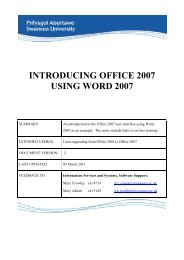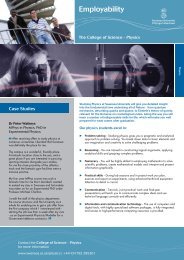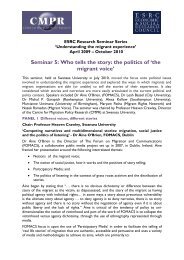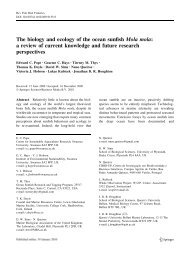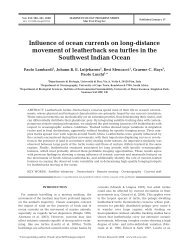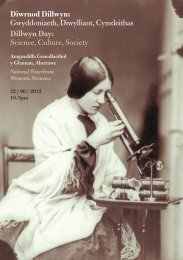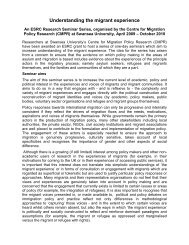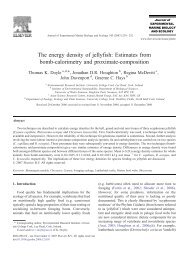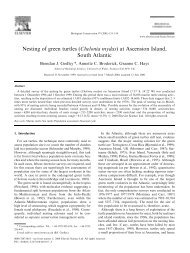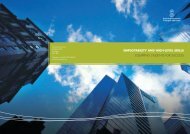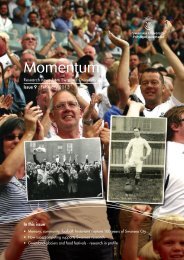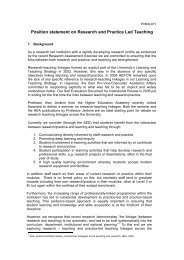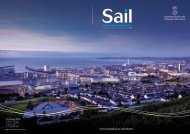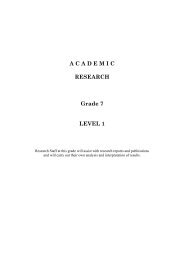Postgraduate Prospectus 2013 - Swansea University
Postgraduate Prospectus 2013 - Swansea University
Postgraduate Prospectus 2013 - Swansea University
Create successful ePaper yourself
Turn your PDF publications into a flip-book with our unique Google optimized e-Paper software.
Modern Languages and Translation<br />
Research opportunities<br />
MA by Research/MPhil, PhD Distance<br />
PhD programme in Applied Linguistics<br />
RAE2008<br />
French: 35% of research rated world-leading<br />
(4*) or internationally excellent (3*)<br />
German: 50% of research rated<br />
world-leading (4*) or internationally<br />
excellent (3*)<br />
Hispanic Studies: 45% of research<br />
rated world-leading (4*) or internationally<br />
excellent (3*)<br />
Italian: 40% of research rated<br />
internationally excellent (3*)<br />
Modern Languages at <strong>Swansea</strong><br />
encompasses the academic areas of French,<br />
German, Hispanic Studies, Italian, and<br />
Translation (including Welsh), specialising in<br />
literature, cinema, cultural history, and the<br />
practice and theory of translation. The<br />
Department of Languages, Translation and<br />
Communication welcomes proposals for<br />
postgraduate research projects that<br />
complement staff research interests.<br />
Research degrees in Modern Languages<br />
and Translation will:<br />
• provide you with new and<br />
specialised research skills<br />
• prepare you for a career in academic<br />
research and teaching<br />
• equip you with skills relevant for a<br />
rewarding career in a range of other<br />
diverse fields, including journalism,<br />
cultural management and diplomacy,<br />
translation, interpreting, teaching,<br />
management, and international business<br />
• enable you to deepen your knowledge<br />
of your area of specialist interest<br />
The Department benefits from extensive<br />
library holdings and maintains a large<br />
collection of audio-visual materials. All<br />
research students are provided with a<br />
networked PC and workspace in<br />
dedicated research student rooms.<br />
Linguistics: 60% of research<br />
rated world-leading (4*) or internationally<br />
excellent (3*)<br />
Welsh: 65% of research rated world-leading<br />
(4*) or internationally excellent (3*)<br />
Professors<br />
D F Connon<br />
D A G Large<br />
J E Preece<br />
A Rothwell<br />
D G Walters<br />
Academic and research staff 15<br />
<strong>Postgraduate</strong>s 50<br />
Translation PhD students have access to a<br />
computer-based language laboratory, a<br />
satellite TV and video-editing lab, an<br />
advanced Translation and Media<br />
computing lab and a more specialised<br />
Translation Research facility housing the<br />
latest digitisation, corpus analysis and<br />
computer-assisted translation tools.<br />
Research Strengths<br />
French<br />
Areas of expertise include the following:<br />
• Medieval Literature, especially<br />
women writers<br />
• Eighteenth century drama, fiction and<br />
literary ideas (including Théâtre de la<br />
foire, the plays of Marivaux, Diderot)<br />
• Nineteenth and twentieth century<br />
novelists (Balzac, Zola, Proust)<br />
• Women’s writing and Gender Theory<br />
(de Beauvoir, Duras, Sagan)<br />
• Drama of the twentieth century<br />
• Politics and literature (eighteenth,<br />
nineteenth and twentieth centuries)<br />
• Politics and religion<br />
• Area Studies (history of social and<br />
political ideas, propaganda and literary<br />
discourse)<br />
• Colonialism and postcolonialism,<br />
relating in particular to Algeria,<br />
Indochina, and Francophone Africa<br />
• War and Culture studies<br />
Entry requirements:<br />
For PhD: normally a good Honours degree<br />
(first-class or 2:1) and an<br />
MA in a relevant field. For MRes<br />
or MPhil: a good Honours degree.<br />
English Language requirement:<br />
IELTS 6.5 (with a minimum of 5.5 in each<br />
component) or <strong>Swansea</strong> <strong>University</strong><br />
recognised equivalent.<br />
Scholarships and Bursaries<br />
A range of postgraduate scholarships and<br />
bursaries is available. For details, please<br />
visit www.swansea.ac.uk/scholarships/<br />
<strong>Postgraduate</strong><br />
German<br />
Much of our activity in German is<br />
concentrated in the Centre for<br />
Contemporary German Culture which has<br />
produced more than a dozen PhDs since<br />
its foundation in 1993. Current topics are:<br />
‘Intercultural Encounters in the Writings of<br />
Michael Roes’ (AHRC funded); and ‘The<br />
Trope of the Good German in American<br />
and German Film since 1990’.<br />
The Centre’s focal points include:<br />
• Women’s writing<br />
• Turkish-German writing<br />
• German-Jewish writing<br />
• German writing from Eastern and<br />
Central Europe<br />
• Baader Meinhof and the Novel<br />
• Crime Fiction<br />
We have also specialists on Germany’s<br />
two recent Nobel Laureates, Günter Grass<br />
(1999) and Herta Müller (2009).<br />
Other specialisms include:<br />
• Ballads and popular culture from the<br />
seventeenth century to the present day<br />
• Romanticism, particularly Hoffmann<br />
• Nineteenth century realism, particularly<br />
Stifter and Fontane<br />
• Nietzsche<br />
How can I find out more?<br />
Visit our website:<br />
www.swansea.ac.uk/languages<br />
Contact the Admissions Tutor:<br />
Email: j.e.preece@swansea.ac.uk<br />
Tel: +44 (0)1792 295926<br />
Visit the <strong>University</strong>: see page 174 for<br />
details<br />
www.swansea.ac.uk/artsandhumanities<br />
/riah<br />
• The German-language Modernist novel,<br />
particularly Broch, Kafka, Thomas<br />
Mann, Musil, and the Canettis<br />
Recent PhD topic (2011): ‘The Literary<br />
Dream in German Central Europe,<br />
1900-1925: A Selective Study of the<br />
Writings of Kafka, Kubin, Meyrink, Musil,<br />
and Schnitzler’.<br />
Italian<br />
Strengths in Italian are mainly in the<br />
twentieth and twenty-first centuries<br />
and include:<br />
• Narrative theory and the writings of<br />
Umberto Eco<br />
• Crime fiction in the 1930s<br />
• Contemporary theatre, esp. Luigi<br />
Pirandello and Dario Fo<br />
Spanish America<br />
Research in this area is conducted through<br />
the Centre for Comparative Research into<br />
the Americas in collaboration with staff<br />
and research students in American Studies.<br />
Areas of special interest are:<br />
• Twentieth century prose and poetry<br />
• Women’s writing and feminist theory<br />
• Contemporary Spanish American film<br />
• Spanish American nation building<br />
• Twentieth century Argentine literature<br />
and culture<br />
Applications can be made online<br />
at: www.swansea.ac.uk/applyonline<br />
– see pages 176 – 177 for further<br />
information<br />
• Twentieth century Chilean literature<br />
and culture<br />
Translation<br />
Staff research interests in Translation cover<br />
a range of themes, including:<br />
• Literary Translation<br />
• Translation Theory (including non-<br />
Western)<br />
• History of Translation<br />
• Comparative Translation Studies<br />
• Corpus-based Translation Analysis<br />
• Translation and the Lexicon<br />
• Computer-based Lexicography and<br />
Terminography<br />
• Translation Processes: Psycholinguistics<br />
of translation, translation workflows<br />
• Comparative translation<br />
software analysis<br />
Applications are encouraged for full-time<br />
or part-time research towards a PhD in<br />
any of these areas and relating to any<br />
of the languages taught (including<br />
Chinese, English, French, German,<br />
Italian, Portuguese, Russian, Spanish,<br />
and Welsh). Current PhDs include two<br />
AHRC-funded projects on comparative<br />
morphology (English/French), ‘German<br />
Translations of Shakespeare’s Sonnets’,<br />
and ‘Translation Memory Systems’, also<br />
funded by the AHRC.<br />
All research students in Languages,<br />
Translation and Communication belong<br />
to the Graduate Centre in the College<br />
of Arts and Humanities. The Centre<br />
provides pastoral as well as<br />
administrative support and is also<br />
responsible for research skills training<br />
and support, and facilitating a lively<br />
intellectual environment for the College’s<br />
postgraduate research community of<br />
200 students.<br />
Research Institute for Arts<br />
and Humanities (RIAH)<br />
The Research Institute for Arts and<br />
Humanities (RIAH) supports two major<br />
Research Centres: the Richard Burton<br />
Centre for the Study of Wales, an<br />
interdisciplinary forum that focuses on the<br />
cultural and historical traditions in the<br />
Welsh and English languages; and the<br />
Callaghan Centre for the Study of<br />
Conflict. RIAH supports a wide range of<br />
other research groups, which provide a<br />
focus for specialist projects, postgraduate<br />
research, grant applications, seminar<br />
series, and contact with external partners.<br />
Those supported by researchers in<br />
Modern European Literatures and<br />
Cultures, include:<br />
• GENCAS, the Centre for Research<br />
into Gender in Culture and Society<br />
• MEICAM, Modern European<br />
Ideologies, Conflict and Memory<br />
• TRAM, Translation Research and<br />
Multilingualism. As a PhD or MPhil<br />
student you will be expected to attend<br />
research events (such as colloquia or<br />
weekly seminars) with visiting speakers<br />
from the UK and abroad.<br />
Research Degrees – Modern Languages and Translation<br />
132<br />
133



